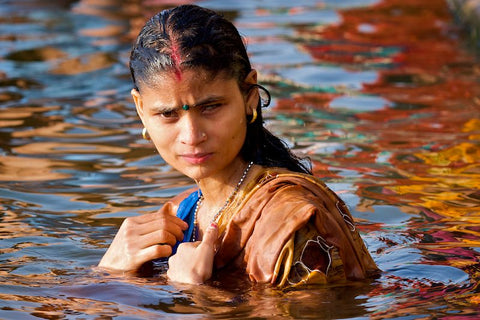Many cultures around the world have customs that restrict people while on their period. Whilst these are associated with traditional attitudes, the approach adopted by western, or westernised societies is considered ‘modern’.
This article is written by Mara Budgen. Read more about Mara at the end of the article.
We may find ourselves being critical of local practices that impose menstrual prohibitions, but with many cultural traditions being replaced by western menstrual customs and beliefs, it’s not necessarily true that women become liberated. What is more, traditional restrictions aren’t always best understood as female oppression. Some of them can empower women by giving them space for autonomy and relieving them of normal duties. Women themselves may see these rules as parts of their local identities, and as being useful to the functioning of society. I’ll leave it up to you to judge… In the first part of this post we’ll be overviewing menstrual taboos in non-western societies. In the second part, we’ll be looking at how non-western cultural traditions celebrate menarche (a girl’s first period) – focussing, in particular, on an unusual example from India. And in the next post, we’ll be exploring the problems of the western cultural attitude to menstruation, by concentrating on advertising.
Omo Valley, Ethiopia and Rome, Italy. Photos by Steve McCurry.
A lot of the obligations imposed on menstruating women are meant to protect other members of the community. For example, men are often thought to be at risk if they have sex with a woman when she’s on her cycle, as menstrual blood is considered polluting. In an extreme case, the Kodi of Sumba (an island in eastern Indonesia) believe that sexually transmitted diseases are contracted by men who have sex with a menstruating woman. More generally, there are cultures in which sexual contact must be avoided between a man and a woman on her period, such as Orthodox Judaism, Islam and Rastafarianism, as well as in Bali. Similarly, to isolate menstruating women from their partners and their families, they’re forced to sleep apart in certain cultural traditions. These include those of Rastafarian societies, Bali, Hindus in South India, and certain tribes in Nigeria, where women are confined to a menstrual hut (a custom that used to be practiced in many parts of the world, but that has gradually disappeared). Again, for the benefit of a menstruating woman’s family, in the Hindu societies of Nepal and Rajasthan, as well as in Bali, Bangladesh, and in Rastafarianism, she’s not allowed to cook or come into contact with other people’s food. Instead, to safeguard the community more generally, and as a form of respect for divinities, women on their cycle must abstain from visiting religious sites in many Hindu societies, as well as in Bali, in Islamic culture and the Shinto religion of Japan. Finally, for a woman to leave behind her unclean (i.e. menstruating) status, she must perform a ritual bath at the end of her cycle: this is practiced, for example, in Bali and in Orthodox Judaism, where the bath is called the mikveh.

Bathing in the Ganga River. Photo by Mariusz Marek Ostrowski.
However, other customs aim to protect menstruating women themselves. In Rajasthan, girls on their period aren’t allowed to walk through crossroads, as they’re thought to be particularly vulnerable to evil spirits when they’re on their cycle. For this same reason, in South India it’s common to keep a piece of iron and/or a lemon. What is more, in South India, once girls reach menarche, they shouldn’t have contact with boys and aren’t allowed to spend as much time outside as before: given that they can now become pregnant, it’s thought that mixing with males is particularly dangerous.
Rajasthan, India. By Steve McCurry.
Interestingly, in many of the societies I have mentioned, whilst menstrual prohibitions are widely practiced, so is the celebration of girls’ menarche. Ceremonies, involving food, family, friends and gifts are customary in Nepal, South India, Bali, Bangladesh, Japan, amongst the Akan of Ghana and the Maroons of Suriname. Amongst the Zulus of South Africa, a goat is slaughtered and the girl is secluded with her friends, emerging the next day to be bathed, smeared with red clay, and taught lessons for adulthood by other women.
A really unique custom honoring menstruation is practiced by the Bauls of Bengal, India. The Bauls are a religious group, mixing elements of Hinduism and Islam, composed of people who renounce the customs of Bengali society in order to survive by collecting money from singing in public places. Bauls venerate bodily substances that Hindu society normally considers unclean, and thus engage in taboo practices such as having sex with menstruating women. Tara, a Baul woman, recounts that when she had her first period, a ceremony took place in which her menstrual blood was mixed with cow’s milk, coconut milk, camphor, palm juice and sugar, and drunk by those present as a potent regenerating substance, increasing memory, concentration, happiness, serenity and love.
Part of the cover of a vinyl record, The Bauls of Bengal (Olympic Records, 1976).
However extreme the Baul practice may seem, it goes to show just how much diversity characterises the way different cultures deal with the monthly cycle. At the same time, a common thread seems to exist: beliefs and practices from all over the world aim to deal with menstruation as an experience that is both frightening and empowering.
Read also: The Wacky World of Cultural Attitudes to Menstruation Part 2
Mara Budgen is a Politics graduate of SOAS (the School of Oriental and African Studies, London) and a freelance journalist. She is a voluntary contributor to Ruby Blog.








